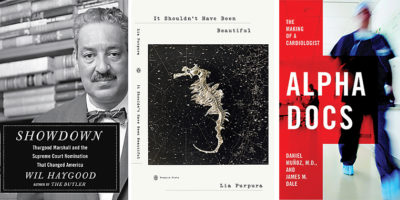A few pages into her new poetry collection, Guinevere in Baltimore, Shelley Puhak drops her first local reference: “O say, can you see?—from 95 North, the swath of city from stadium to incinerator smokestack.” That poem, “Lancelot, En Route, Stopping Off at Fort McHenry,” not only unmistakably establishes the Baltimore setting, but also introduces the third-wheel member of the troubled love triangle at the core of her book, a modern-day take on the venerable Arthurian legend.
Winner of the eighth annual Anthony Hecht Poetry Prize, Guinevere in Baltimore unspools as a linked series, with King Arthur recast as the cuckolded CEO of an overseas shipping corporation; Queen Guinevere as his adulterous, ennui-ridden wife; and self-doubting Sir Lancelot as the firm’s top salesman, Arthur’s best buddy, and Guinevere’s lover. Puhak deftly nestles the trio into a landscape of Baltimore landmarks (Bromo Seltzer Arts Tower, The Walters Art Musuem, Fells Point wharf) and history (Great Fire of 1904).
“I was inspired by the medieval troubadours’ use of love stories to explore political and economic themes,” explains Puhak, a professor of English at Notre Dame of Maryland University. “I was also looking for a legend that contained within it the seeds of its own destruction.”
Via her three principals, she conveys that tragedy both personally and professionally, characterizing the poems’ overarching theme as “an examination of selling out, of settling. It’s also an exploration of how the metaphors we use change the arguments we have.”
Puhak lives in Catonsville with her husband and their 6-year-old son. Her poems evince an intimate knowledge of Baltimore, its streets, buildings, and sensibility. “Baltimore offered me concrete evidence for how ideas and biases are etched onto landscapes,” she says. “I’m drawn to how layered it is: asphalt over cobblestone, bike lane over old streetcar rails.”
























